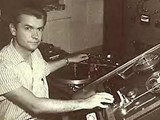by Brian Robin
Who was Sam Phillips?
In Million Dollar Quartet, Sam Phillips is largely seen as a conduit, taking you from one member of the quartet to the next, providing a brief introduction along the way. Theatregoers to the musical, book by Colin Escott and Floyd Mutrux, original concept and direction by Mutrux, see the omniscient narrator as he walks you through the events of Dec. 6, 1956.
Having Phillips as your tour guide through one of the seminal events in the early days of the rock and roll era is perfect. At the same time, he’s not a mere museum tour guide—he literally built the museum.
Simply put, Phillips is one of the most important figures in rock and roll history. Yes, there’s the discovering Elvis Presley part. Not only did Phillips—with a generous assist from Memphis radio personality Marion Keisker—record Presley’s first works: “That’s All Right” and the B-side “Blue Moon of Kentucky,” but he also taught the young Presley production techniques he’d employ the rest of his career.
It was Phillips and his emphasis on feel and emotion over technical perfection that gave Presley and his fellow Sun musicians a unique and transcendent sound. When he recorded Presley, Phillips took the counterintuitive approach of scaling back his vocals and blending it more with the instrumentals. According to samphillips.com, the producer created a unique echo by using tape delay during the recording process.
After Phillips sold Presley’s contract to RCA, producers at that large label couldn’t duplicate that echo. Phillips refused to tell how he did it.
His creation of the “Elvis Echo” scratched the surface of Phillips’ technical wizardry. He missed nothing in his search for the ideal sound.
Phillips walked through his studio clapping to discover the exact reverb and echo in every spot. And during the recording of Carl Perkins’ “Blue Suede Shoes,” Phillips put cardboard boxes over the amplifiers, turned them around to face the wall, then added a mic to the back of the amplifiers. That brought Perkins’ masterpiece a rattling muffled sound, according to Popular Mechanics.
That alone would warrant Phillips’ face on a musical Mt. Rushmore. But put that aside from the moment and there’s producing “Rocket 88” by Jackie Brenston and His Delta Cats. The 1951 song celebrating the power and joy of the newly released Oldsmobile Delta 88 is considered by several music historians, including historian and Phillips biographer Peter Guralnick and The New Rolling Stone Encyclopedia of Rock & Roll, among others, as the first rock and roll record. That song, written by 19-year-old band member Ike Turner, was released by Chess Records.
Put that aside for the moment and there’s Sun Records, which Phillips founded in 1952 in Memphis. Aside from serving as the setting for Million Dollar Quartet, Sun Records produced 226 singles during Phillips’ 16-year reign at the controls—more than any other record label during that period.
There’s also the Who’s Who conga line of familiar names who followed Presley through the Sun Records doors, starting with his three Million Dollar Quartet cohorts: Perkins, Jerry Lee Lewis and Johnny Cash. That segued into the likes of BB King, Roy Orbison, Howlin’ Wolf and Charlie Rich, among numerous others.
And there’s Phillips’ love of the blues—and what they stood for.
“The blues, it got people—black and white—to think about life, how difficult, yet also how good it can be. They would sing about it, they would pray about it; they would preach about it. This is how they relieved the burden of what existed day in and day out,” Phillips told writer Eric P. Olsen in “Founding Father: Sam Phillips and the Birth of Rock and Roll” The World and I.
Take that another step and there’s Phillips’ well-deserved reputation as a beacon of equality. He used music as a sledgehammer against racial barriers. Sun Records’ first 20 releases—which Guralnick called “among the greatest recordings he ever made”—were by African American artists such as Howlin’ Wolf, Rufus Thomas, Little Junior Parker and The Prisonaires.
In 1955, Phillips flipped the switch on WHER Radio in Memphis. It became the first all-female radio station in the country. Almost every position at the station was held by a woman.
When you put all those asides back together, it’s easy to understand why Phillips was inducted into the Rock and Roll Hall of Fame inaugural 1986 class. He was the first non-performer inducted, but it wouldn’t be the last Hall of Fame bringing Phillips inside. Phillips was inducted into the Rockabilly Hall of Fame, the Alabama Music Hall of Fame, the Blues Hall of Fame, the Country Music Hall of Fame and into the inaugural Memphis Music Hall of Fame.
Phillips sold Sun Records to Shelby Singleton in 1969. He was one of the first investors in Holiday Inn and built a radio station chain in Alabama his children and granddaughter now run. Phillips died a multi-millionaire in 2003.
Million Dollar Quartet is Outside SCR’s 2022 production at the historic Mission San Juan Capistrano. Directed by James Moye, who played Phillips during the production’s 2011-12 off-Broadway run, Million Dollar Quartet runs July 30-August 21.


